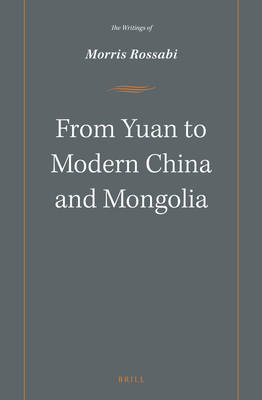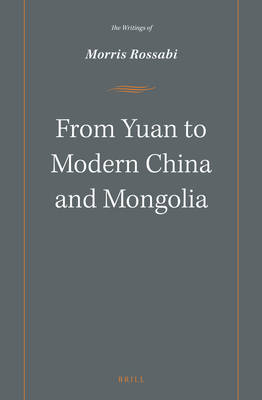
- Afhalen na 1 uur in een winkel met voorraad
- Gratis thuislevering in België vanaf € 30
- Ruim aanbod met 7 miljoen producten
- Afhalen na 1 uur in een winkel met voorraad
- Gratis thuislevering in België vanaf € 30
- Ruim aanbod met 7 miljoen producten
Zoeken
€ 482,45
+ 964 punten
Omschrijving
This wide-ranging work, consisting of selected essays of Morris Rossabi, reflects the diverse interests of a leading scholar of China and Inner Asia. It encompasses the eras from the thirteenth century to the present, territories stretching from China to Mongolia to Central Asia and to the Middle East, and religions from Islam to Nestorian Christianity to Judaism and Confucianism in East, Central, and West Asia.
Rossabi first challenged the conventional wisdom concerning traditional Chinese foreign relations by showing the pragmatism of Chinese officials who were not bound by Confucian strictures and stereotypes about foreigners and were actually knowledgeable about neighboring regions.
His studies of the territories surrounding China led to the discovery of a major omission in historical writing--the lack of a biography of Khubilai Khan, one of the most renowned rulers in Eurasian history. His biography of Khubilai resulted in further studies of the Mongolian legacy on global history and of the significant role of women in the Mongolian empire. His repeated travels in Mongolia, in turn, stimulated an interest in modern Mongolia, especially the turbulence following the turbulence after the collapse of socialism in 1990, a subject he writes about in this book.
The need for greater public knowledge and awareness of China, Mongolia, Central Asia, the Silk Roads, and Islam in Asia prompted Rossabi to write general, occasionally pedagogical, articles about these topics for a wider audience.
Rossabi first challenged the conventional wisdom concerning traditional Chinese foreign relations by showing the pragmatism of Chinese officials who were not bound by Confucian strictures and stereotypes about foreigners and were actually knowledgeable about neighboring regions.
His studies of the territories surrounding China led to the discovery of a major omission in historical writing--the lack of a biography of Khubilai Khan, one of the most renowned rulers in Eurasian history. His biography of Khubilai resulted in further studies of the Mongolian legacy on global history and of the significant role of women in the Mongolian empire. His repeated travels in Mongolia, in turn, stimulated an interest in modern Mongolia, especially the turbulence following the turbulence after the collapse of socialism in 1990, a subject he writes about in this book.
The need for greater public knowledge and awareness of China, Mongolia, Central Asia, the Silk Roads, and Islam in Asia prompted Rossabi to write general, occasionally pedagogical, articles about these topics for a wider audience.
Specificaties
Betrokkenen
- Auteur(s):
- Uitgeverij:
Inhoud
- Aantal bladzijden:
- 712
- Taal:
- Engels
- Reeks:
- Reeksnummer:
- nr. 6
Eigenschappen
- Productcode (EAN):
- 9789004281264
- Verschijningsdatum:
- 28/11/2014
- Uitvoering:
- Hardcover
- Formaat:
- Genaaid
- Afmetingen:
- 157 mm x 239 mm
- Gewicht:
- 1202 g

Alleen bij Standaard Boekhandel
+ 964 punten op je klantenkaart van Standaard Boekhandel
Beoordelingen
We publiceren alleen reviews die voldoen aan de voorwaarden voor reviews. Bekijk onze voorwaarden voor reviews.











